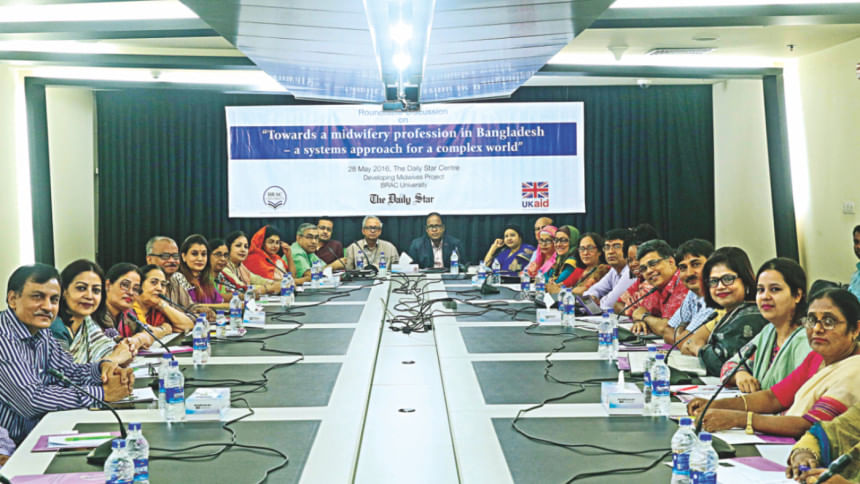Govt, Brac University join hands to train midwives

Since ensuring midwives in rural areas can drastically reduce maternal and child mortality, the private sector has been training them up in significant numbers along with the government to meet the needs, experts told a roundtable yesterday.
The government and Brac University started developing a midwifery programme since 2012 and so far 661 graduated from Bangladesh Nursing and Midwifery Council (BNMC). Of them, Brac University alone developed 163 into qualified midwives, they said.
Brac University, ukaid and The Daily Star jointly organised the roundtable, “Towards a Midwifery Profession in Bangladesh - a Systems Approach for a Complex World”, at The Daily Star Centre in the capital.
Dr Jahir Uddin Ahmed, interim chairperson of the Department of Midwifery and Nursing at Brac University, gave a keynote presentation on “Developing Midwives in Bangladesh.”
He mentioned that the main purpose of the midwifery programme was to develop a competent and compassionate cadre of midwives to serve in hard-to-reach areas of the country.
“The country needs more than 20,000 midwives whereas we have very few of them graduated so far. To overcome this situation, both the government and private sector need to work together and make arrangements for having more midwives in the coming days,” he said.
Appreciating the initiatives of Brac University, Dr Abu Jamil Faisel, country director of EngenderHealth, said retention of faculties at rural academic sites, faculty development, quality education and sustainability remain major challenges for the sector.
Admitting the fact, graduate midwives and students of midwifery department emphasised the importance of deployment of midwives after graduation to encourage young people to join the force.
Mohammad Sharif, director of Maternal and Child Health Services at Directorate General of Family Planning (DGFP), suggested providing one year training to 4,800 Family Welfare Visitors of DGFP. “They already have major portions of the training, an additional year would make them professionals,” he added.
Halima Akhter, president of Bangladeshi Midwifery Society, urged the government to provide midwives with delivery kits.
BNMC Registrar Shuriya Begum said in order to conduct deliveries, midwives should be given a facility containing at least two rooms, one for observation and another for deliveries. She suggested utilising the existing infrastructure of community clinics for the purpose and demanded that the government recruit over 600 trained midwives as soon as possible.
Goutam Aich Sarker, joint secretary (nursing), Ministry of Health and Family Welfare , said the term “midwife” should be properly acknowledged and accepted everywhere and the government and private sector should work together to make sure that midwives were available in every corner of the country. He also stated that 23 percent of deliveries were done through caesarean section, which was alarming. “The rate can be reduced by increasing the number of midwives,” he said. He added that traditional, untrained midwives should not be carrying out deliveries as the safety of every single mother was of prime importance.
Dr Ahmed Mushtaque Raza Chowdhury, vice-chairperson, Brac, said Bangladesh's maternal mortality rate (170 per 100,000 live births) was lower than that in India and Pakistan but much higher than that in Sri Lanka (30 per 100,000). “Maternal mortality will reduce significantly with more midwives,” he said, suggesting introducing additional incentives for midwives who come forward to work in rural areas. He also informed that Brac was planning to provide loans to midwives after they graduate so that they can start their own clinics in the villages.
Dr Shehlina Ahmed, health and population adviser, DFID; Dr Rondi Anderson, midwifery specialist, UNFPA; Dr Monira Parveen, Canadian field manager, Cowater International Inc, and Dr Tamjida Hanfi, program manager, Brac, spoke among other dignitaries.

 For all latest news, follow The Daily Star's Google News channel.
For all latest news, follow The Daily Star's Google News channel. 



Comments